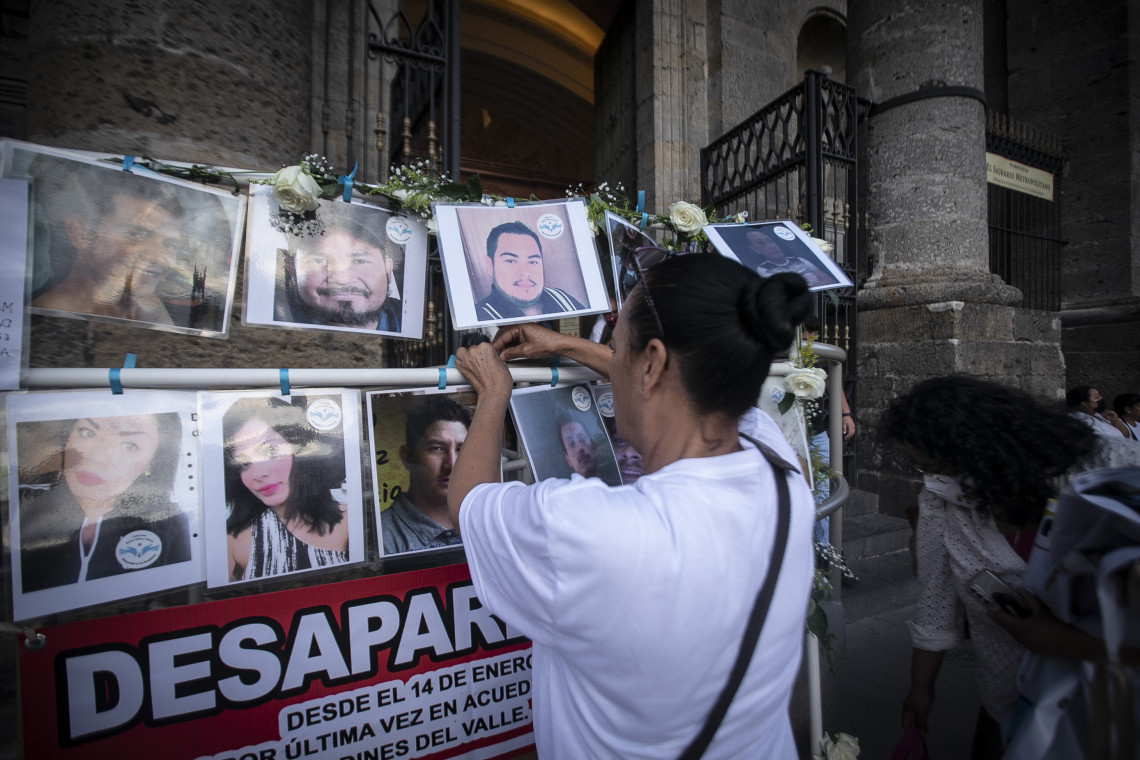
Mexico and Central America: The ICRC calls on states to step up and coordinate efforts to protect people affected by armed violence
Mexico City (ICRC). The high human cost of violence in Mexico and Central American countries is an issue that can only be addressed through sustained and coordinated cross-border action by states, according to the International Committee of the Red Cross (ICRC).
At the presentation of its 2024 Humanitarian Reports on Tuesday, 23 April, the ICRC's regional delegation for Mexico and Central America called on states to step up their efforts to protect people affected by armed violence through interinstitutional coordination, prevention strategies and effective responses to meet their needs. It also highlighted the need to strengthen cross-border cooperation mechanisms with initiatives including bilateral meetings, information-sharing mechanisms and the standardisation of practices.
"Acknowledging the painful reality of the plight of victims, ensuring their needs are visible and recognized and stepping up efforts to alleviate their suffering is a humanitarian imperative that cannot wait and an obligation for states, the international community and society," observes Olivier Dubois, head of the ICRC's regional delegation for Mexico and Central America.
Measures adopted to address the humanitarian issues affecting the region, including migration, missing people, unidentified remains and forced displacement, can only be effective if sustained diplomacy and cooperation efforts are undertaken to ensure continuity through changes of government. "It is vital to safeguard the advances made in our responses to assist and protect people affected by violence", cautions Dubois.
In 2023, ICRC teams in Mexico and Central America witnessed the devastating impact of violence, which results in new victims every day and growing humanitarian consequences. Some of these consequences are more visible, such as the high number of killings. According to official figures,* in 2023, 2,944 people were murdered in Guatemala, and there were an average of 8.3 murders a day in Honduras and 81 in Mexico.
Not all the effects of violence are as visible. The ICRC points out that there are victims who endure the consequences of violence in silence, which means that their suffering can go unnoticed: a youngster who goes missing without a trace on the migration route; a teenager who survives a sexual assault but is too frightened to seek help; a family that decides to flee their home on the spur of the moment in fear of their lives; or a mother in another country searching for her son who went missing after migrating.
The ICRC also warns of the growing humanitarian emergency facing people who decide to leave their home country in search of a safer life or better prospects. According to official figures,* in 2023 over half a million people braved the Darién Gap, a dense stretch of jungle straddling Panama and Colombia. The number of migrants entering Honduras irregularly almost tripled the previous year's figure, and irregular migrants passing through Mexico increased by 77%. The figures also show that in 2023 Mexico was among the top five countries worldwide in terms of applications for refugee status, with more than 140,000 people seeking asylum. As their journey progresses, migrants are more likely to fall victim to crime and their protection needs become greater.
Neutral, impartial and independent humanitarian action remains a key response in reducing people's suffering and mitigating the consequences of violence. "We urge the authorities, communicators and society to protect and facilitate humanitarian work, which is crucial in ensuring that aid reaches those most in need."
In its Humanitarian Reports, the ICRC therefore calls for action to address the most pressing humanitarian concerns for 2024 and beyond: humanitarian work, missing people, identification of the dead, human mobility, people deprived of their liberty in prisons, communities affected by violence and health-care workers.

In 2023, the ICRC's regional delegation for Mexico and Central America worked to protect missing people and the dead and their families, people deprived of their liberty and communities affected by violence. It worked with the region's National Red Cross Societies, focusing on activities to assist and protect migrants and strengthen Red Cross capacity in the region's countries to provide services to keep families in touch, prevent migrants from going missing and support the families of missing migrants.
The ICRC provided direct support to 258 internally displaced people and returning migrants in El Salvador and Honduras in 2023 under a comprehensive programme aimed at helping such people exercise their rights and access essential services, including support for income-generating projects. It provided 62,512 medical consultations and treatments for migrants at assistance points operated by National Red Cross Societies and over 135,000 free phone calls and wi-fi connections for people on the move to help them keep in touch with their families. In Mexico, it carried out 16 visits to six immigration detention centres and temporary holding facilities, and 305 people were able to exercise their rights and access services at these facilities thanks to its work.
In Panama, in cooperation with the Pinogana municipal authorities and the Institute of Legal Medicine and Forensic Science (IMELCF) and as part of its humanitarian forensic response, the ICRC completed the construction of a module consisting of 100 individual vaults, where unidentified and unclaimed deceased migrants are temporarily preserved or laid to rest.
The ICRC carried out 60 visits to 14 prisons in Honduras and El Salvador to monitor the conditions of detention and promote the dignified treatment of detainees, which included engaging in bilateral confidential dialogue with the authorities concerned.
The ICRC stresses that the purpose of its work in Mexico and Central America is to alleviate the suffering of victims of violence through impartial and neutral humanitarian action. Its mission is to protect people's lives and dignity by listening to their concerns and responding to their humanitarian needs. It reaffirms its commitment to working with the region's states to strengthen protection mechanisms and develop and implement regulatory frameworks in line with international law and standards.
Mexico and Central America: "The urgent need for a coordinated response to silent violence

Olivier Dubois
Head of the ICRC's regional delegation for Mexico and Central America
It is this silent violence that worries us the most, because whole families and communities are no longer able to live in peace and follow their dreams, but this violence may go unnoticed. Only those who sit at a comfortable distance can act like nothing is happening and convince themselves that this silence is peaceful rather than fearful.
READ: "THE URGENT NEED FOR A COORDINATED RESPONSE TO SILENT VIOLENCE"
Media contact
Ana Langner, Public Communication Officer: olangnerleyva@icrc.org y +52 5537176427
